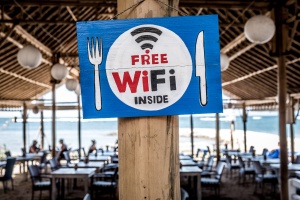That hotel Wi-Fi Is unsafe. Learn why

Whether you are traveling for business or pleasure, hotels offering free Wi-Fi come as a relief. As soon as you reach the lobby or the comfort of your room, you can search for the best restaurant nearby or send that urgent report your boss has been asking for.
You might feel secure when accessing the Wi-Fi since the hotel shares the login password with you when you check-in, or you might be able to log in only after you have shared your room number. However, security experts deem hotel Wi-Fi as dangerous that might ruin your trip. Let’s find out why.
Why you should not use hotel Wi-Fi
The feeling of security can be misleading. Imagine that you check-in into a fancy hotel expecting the best service possible. And, in many ways, you will receive it. However, hotel Wi-Fi is a delicate matter, with many networks lacking the most basic security mechanisms. For instance, even the FBI has emphasized the potential dangers of hotel Wi-Fi.
For instance, hackers could lurk near luxurious hotels in hopes of capturing data. Typically, hotel Wi-Fi features a password. However, it is usually very simple, like the name of the hotel or the specific room. Thus, connecting to it and potentially intercepting other connected users’ traffic is relatively easy. Why? Because most free Wi-Fi networks allow data to travel unencrypted. Configuration flaws can also have severe consequences. It could simplify hackers’ jobs when they attempt to steal users’ credentials.
The dangers of using free Wi-Fi
Here are two of the most common ways your hotel Wi-Fi or any other public Wi-Fi may compromise your personal information.
• Credit card details may be stolen. It’s possible for a hacker to steal your credit card details when you log into your hotel Wi-Fi by launching a man-in-the-middle attack. What’s that? When your data flows from your device to the bank or the store, it’s intercepted by the hacker before it reaches the destination. The hacker only has to steal your credit card information by intercepting it as soon as you’ve entered it before it reaches its destination.
• Another method adopted by hackers is the evil twin attack. It means hackers create their own Wi-Fi network, which closely resembles the one belonging to the hotel. As soon as you’ve logged into this network, the hacker starts monitoring all your online activities, including the credit card details you enter.
• Usernames and passwords may be stolen. You take the grave risk of exposing your log-in details to cybercriminals when you enter them into sites on your hotel Wi-Fi. When you enter your username and password to log into your bank account, there’s every possibility of a hacker finding access to it which can let him log into your bank account. You run the same risk if you access any of your accounts.
Is it possible to connect to Wi-Fi safely?
You should avoid accessing any of your financial or personal sites when you use your hotel’s Wi-Fi connection or any other public Wi-Fi, for that matter. The wisest thing to do is to avoid visiting any site where you need to log in while using public Wi-Fi.
We’ve now made you aware of the risks involved in using your hotel’s Wi-Fi. Here are common tips on how you should protect yourself.
• Check the settings. You would do wise to ensure that the device you use is on appropriate settings that boost its security. Make sure that you’ve turned off the feature that automatically connects your device to the nearest available Wi-Fi network. You should also keep your Bluetooth turned off when you aren’t using it.
• Keep away from sensitive sites. Avoid logging into sites that store any sensitive information of yours like any retail websites, websites of banks or any financial institution, social media profiles, health provider sites, or your email accounts.
• Change your passwords. It’s a very good idea to change your passwords to more complex ones for sites that need your sensitive information like your social media profiles, banking, or email accounts before you set off. Once you’re back home, change them again.
• Encrypt internet traffic. A very effective strategy to keep hackers at bay is to get a VPN. A Virtual Private Network protects you by ensuring that all of your internet traffic gets properly encrypted. Thus, a VPN protects you after you connect to a free Wi-Fi hotspot.
Conclusion
We live in unsafe times when using any public Wi-Fi, including that of your hotel, can land you in big trouble. Using your hotel’s Wi-Fi leaves you at risk of man-in-the-middle and evil twin attacks. You risk having your credit card and login details stolen. Stay cautious and follow our tips for a safe and secure online experience that ensures your privacy as well.

